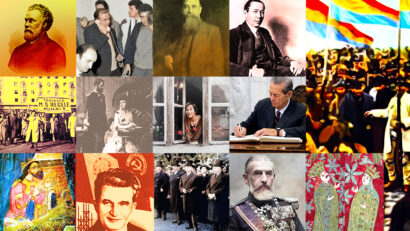Germans and Soviets in Romania, in the Second World War
In WWII Romania was visited by both German and Russian troops and their presence left quite an impression upon the eyewitnesses at that time

Steliu Lambru, 19.02.2024, 20:18
Wars are some of the most horrendous forms of human degradation. During the Second World War, the war hit limits that are hard to imagine. It was the war where civilians had a lot to suffer, it was the war at the end of which international law was changed and recreated, significantly, in a bid to cover all the atrocities that were perpetrated. Notwithstanding, the overwhelming majority of the abuses and killings civilians had been subjected to, have remained unpunished. The civilians’ memory regarding the occupation armies has been significantly influenced by every individual’s experience and by the intensity of their own suffering.
Just like other Central and Eastern European states, Romania had the misfortune of going through both types of occupation during the Second World War. The Romanians and the other Central-European citizen drew a comparison between the German and then the Soviet patterns of behavior. All things considered, the German behavior was perceived as being positive, while the Soviet type of behavior was described as negative. With respect to the Germans, the memories of the Romanians who lived back then, quite a few of them confirmed by archive documents, speak about some friendly, honest and dependable people. About the Soviets, the memories are, on the contrary, negative: they were aggressive people, irrational selfish and dominated by animalistic impulses. Radio Romania’s Oral History Center had the opportunity to record testimonies of those who witnessed how people from the two armies behaved, which prompted them to have the aforementioned perceptions of them.
In 1999, nurse Petre Radu Damian reminisced how he was dispatched to Campina in 1939, where the first German transmission troops had been stationed Apart from the military technique, the Germans arrived there with sanitary vehicles and facilities that amazed Damian.
Petre Damian: “And we went to the other side, to them, in front of the barracks there was the colonel commander of the Panzer unit. It was for the first time when I saw some big jars, then the trend in the treatment of blennorrhagia, as well as many other things I hadn’t seen before. I was accepted among them, it was a great joy for them and I was quick to make friends with a physician hailing from Banat, but their chief was a captain. The collaboration was great. The medical stuff they were researching had to do with interpretation and tests, they made extensive use of laboratories. ”
Trader Aristide Ionescu in 2000 reminisced how the German military behaved, who lived in his parents’ house, in a commune in Valcea county.
Aristide Ionescu: “In 1940, it was winter, the German troops arrived in the country, those who were about to attack Russia; in our commune, they were accommodated in the school building, in some barracks. The behavior the Germans had was very disciplined, not a single thing was taken from a peasant without paying back, and in our house there were the headquarters, in our study there were the headquarters. We had two adjoining passage rooms; I was living in the room at the back, while in the first room a German lieutenant was accommodated. As I was passing through his room, I saw he left his watch there, he left some of his other things there as well. I always locked my room, and then I got the hang of it and I didn’t lock my room any more. One night they simply vanished. The German unit moved on and the whole village found out about it. At about 10 a motorcycle stops in front of our gate and the motorcyclist tells me, in a French language which was quitter fluent, that the lieutenant whom I accommodated took a little pillow by mistake and was handing it back.”
The war changed after 1944 and the Soviets came as liberators. But they weren’t like that at all. Here is Petre Radu Damian.
Track:” When the Russians came, there were groups of raiders, you know. On command or not, I don’t know, some of them entered our street. I remember one particular time, there was only one of these troops on a horse, which he had probably stolen from somewhere. He had with him that famous Russian assault rifle, which we called Balalaika. He entered our courtyard and told me to catch him two geese and bind their legs. He wanted me to carry those geese for him to their residence. Our dog attacked him and he shot the gun against the dog wounding it. He was also drunk, which was quite common, because back then we were seeing lots of Russian soldiers drunk, as they use to drink everywhere. I remember them shooting their rifles against them wine barrels and did a lot of bad things at that time.”
But more serious than those raids were the murders and rapes the Soviet troops committed. Aristide Ionescu recalled the case of such a rape.
Aristide Ionescu:” On September 20th 1944 the first Russians carrying their assault rifles entered our commune. They came from Drăgăşani and entered the house of one of our relatives named Trican, who had the first house in our commune. There the Russians were given food and drinks and after eating and drinking, they got drunk and raped a woman who was over 60 years old.”
The recollections of the Romanians regarding the behaviours of the Russian and German troops on the Romanian territory are polarized and will remain the same because history can be neither forgotten nor erased.





























